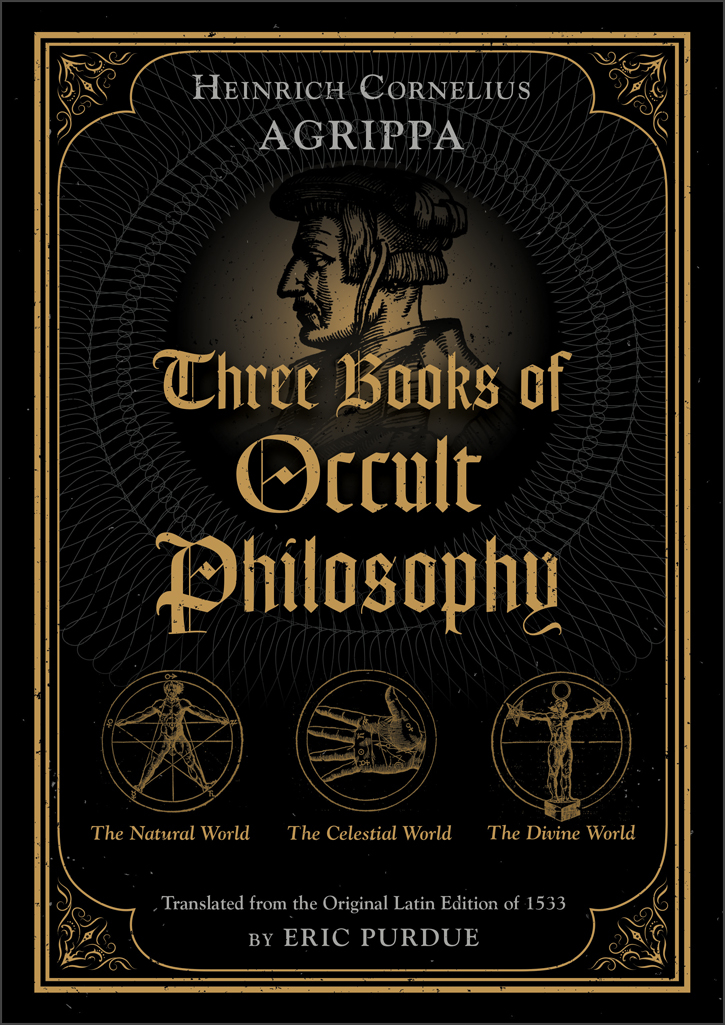Inner Traditions has announced the November 16, 2021, publication of the first new translation in 350 years of Agrippa’s influential Three Books of Occult Philosophy. Translated and annotated by Eric Purdue, it will appear as a three-volume hardcover slipcased edition weighing in at a whopping 896 pages with 135 black-and-white illustrations.
Modern editions of Agrippa have been based on a 1651 translation by “J.F.” For this new edition, Purdue has gone back to Agrippa’s original 1533 edition and freshly translated the Latin text, supported by his understanding of recent scholarship on Renaissance astrology. This edition also corrects previous errors, including J.F.’s mistranslations of many stone and plant names. Finally, this edition identifies the source documents from which Agrippa copy-and-pasted in compiling his text, showing Agrippa to be a systematizer of existing occult works.
One of the most important texts in the Western magical tradition for nearly 500 years, Heinrich Cornelius Agrippa’s 1533 work Three Books of Occult Philosophy collates a multitude of sources from the Classical, Medieval, and Renaissance periods and organizes them into a coherent explanation of the magical world. Divided into three parts–the natural world, the celestial world, and the divine world–the book systematically explains the philosophy, logic, and methods of magic and astrology and how they work, offering numerous examples, diagrams, techniques, and analogies.
Agrippa’s seminal masterpiece provided the basis for 19th-century magical orders such as the Golden Dawn and has been a primary source for countless books on magical uses of stones, herbs, incense, and astrology. Additionally, Agrippa’s many lists and diagrams, especially the planetary seals and magic squares, have proven invaluable to magicians since the 16th century. Yet, up until now, all English editions of Agrippa’s Three Books were based on the same flawed 1651 translation from the mysterious “J.F.”
In this new translation from the original 1533 Latin edition, Eric Purdue corrects the many mistranslations, copyist mistakes, and errors introduced from other editions, as well as restores all of Agrippa’s original illustrations. He notates every correction from earlier editions and offers commentary to rectify the original translator’s mistranslations. Drawing on major developments in the research of older magical and astrological texts since the 1990s, Purdue also presents a nearly complete bibliography of Agrippa’s primary sources, revealing how Agrippa was not writing from missing or secret texts but was a mainstream scholar of his day.
Presenting the first new English translation of Three Books of Occult Philosophy in more than 350 years, this three-volume hardcover boxed set repairs the gaps in knowledge pervasive in the original translation as well as restores the magical spirit of Agrippa’s masterpiece, allowing us to hear Agrippa speak again.


What’s the best way to get your hands on this new edition? And which edition would you recommend be read FIRST – this new one or another translation?
The edition by Eric Purdue, as described in the blog post, won’t be out until November 16. Inner Traditions is publishing it, so you should be able to order it through your preferred bookseller. Looks like it will be a great, if not the definitive, edition. If you can’t wait until November 16, or if it’s too pricey, Llewellyn publishes an edition of Agrippa’s Three Books with annotations by Donald Tyson. In terms of which one to read first, I’d suggest the Inner Traditions edition, as Eric Purdue went back to the original Latin text and corrected errors which had crept into subsequent translations.
Thank you so much!!! I’m going to preorder it NOW!